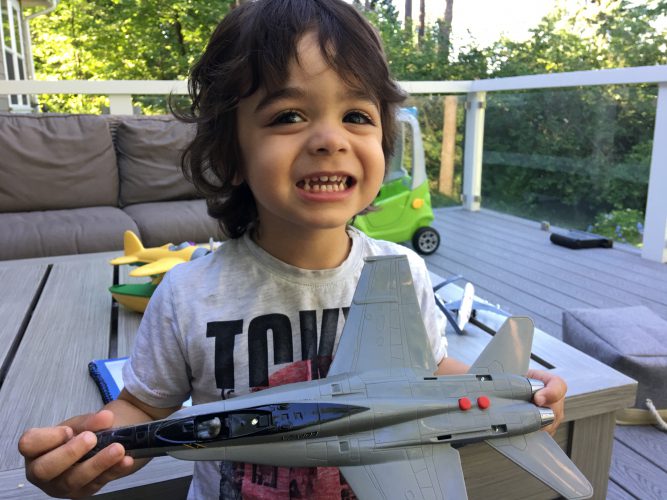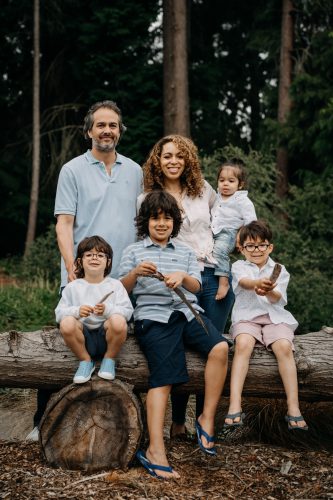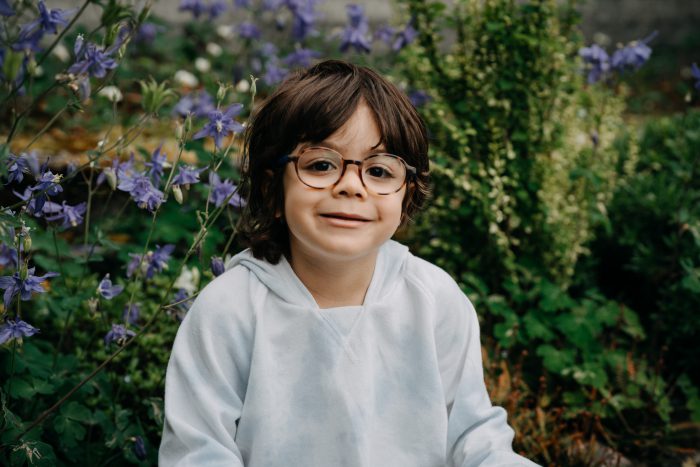After Tragedy, Family Raises Awareness for Drowning Prevention
6.13.2019 | Seattle Children's Press Team

At 3 years old, Yori Tsunoda was a bright and energetic boy who was always on the go.
“Yori had a huge personality,” his mother, Chezik Tsunoda, said. “As the third of four boys, he knew how to stand out. He was really silly, always made everyone laugh and loved playing with his brothers.”
The toddler had a knack for puzzles and a vast knowledge of airplanes. One of Yori’s favorite books was an airplane encyclopedia and he could name any plane by the picture.
Less than a year ago, Yori was at a friend’s house playing in the pool when he quietly slipped below the surface. When Yori was pulled from the water, it was clear that he was not breathing and did not have a pulse. After a few minutes of CPR, first responders arrived. They were able to revive his heart and transfer him to Seattle Children’s.
While Yori’s body eventually recovered, his brain never regained function due to a severe lack of oxygen, which is, unfortunately, the case with many drowning victims. Two weeks later, he was pronounced brain dead and passed away on Sept. 1, 2018.
“I had no idea when we walked into the hospital that we would not be walking out with him,” Tsunoda said. “As a parent, you assume it’s going to be okay, but it wasn’t. We were completely devastated.”
A message for other families
 Unfortunately, Yori’s tragic situation is not unique. Drowning is a leading cause of injury death in children, according to new guidelines from the American Academy of Pediatrics. In 2017, almost 1,000 U.S. children and teens died from drowning. Most drownings in young kids occur in bathtubs and swimming pools. Even in cases where victims don’t pass away, they can be left with debilitating neurological outcomes.
Unfortunately, Yori’s tragic situation is not unique. Drowning is a leading cause of injury death in children, according to new guidelines from the American Academy of Pediatrics. In 2017, almost 1,000 U.S. children and teens died from drowning. Most drownings in young kids occur in bathtubs and swimming pools. Even in cases where victims don’t pass away, they can be left with debilitating neurological outcomes.
Tsunoda wants other parents to know how prevalent drowning is and how quickly it can happen. She said it’s important for parents to supervise their children at all times, or designate another adult to watch the water.
“Drowning is the number one reason children up to age 4 die, and it’s entirely preventable,” Tsunoda said. “In less than one minute, a toddler can drown and die. It’s critical that parents are aware of this risk and watch their children in the water at all times.”
Tsunoda encourages parents to make sure their children wear life jackets and are enrolled in swim lessons, such as classes that teach survival swim skills. She also recommends that parents learn CPR as a precaution because that alone can mean the difference between life and death.
“I don’t want any other parent to go through what we’ve gone through,” Tsunoda said. “It’s important to know all the steps you can take to protect your child when they’re in the water.”
Yori’s legacy

In addition to advocating for drowning prevention, Tsunoda and her husband are putting their efforts toward research that will push the boundaries around solutions for hypoxic brain injury.
“When you’re in a desperate situation, you want to ensure everything possible is being done for your child,” Tsunoda said. “After losing Yori, we knew immediately that we wanted to support research that could potentially help uncover new treatments for brain hypoxia and help other families like us.”
The family has found a common bond and drive in Dr. Nino Ramirez, director of the Center for Integrative Brain Research, who has expertise within this area of research.
“He has let us be engaged in the research process in a way that we never anticipated,” Tsunoda said. “It was clear that he knew we were on a mission.”
Since their initial meeting in February, there is already a group of experiments in motion attempting to address critical questions and potential therapeutic interventions.
After starting a fundraiser in October 2018, the family has raised more than $50,000 thus far for research.
“We feel very fortunate that our family, friends and even strangers read Yori’s story and are showing their support in this way,” Tsunoda said. “Yori was here for a reason, and hopefully this is the beginning of his legacy.”
Tsunoda also hopes that her family’s story can serve as a reminder for other families to appreciate every day they have with their children.
“Being a parent is a hard job and can be challenging,” she said. “But it’s important to not take any moment for granted and when it feels tough, love harder and hug your kids tighter. You never know what life can bring, so be grateful for every moment you have with them.”